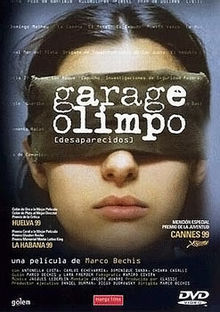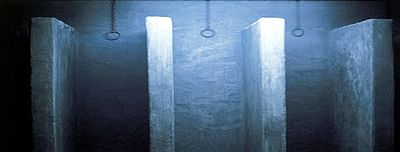- Olympic Garage
-
Olympic Garage 
DVD coverDirected by Marco Bechis Produced by Daniel Burman
Diego Dubcovsky
Amedeo Pagani
Eric HeumannWritten by Marco Bechis
Lara FremderStarring Antonella Costa
Carlos Echevarría
Enrique PiñeyroMusic by Jacques Lederlin Cinematography Ramiro Civita Editing by Jacopo Quadri Distributed by Aqua Films
BD CineRelease date(s) May 16, 1999 (France)
September 2, 1999 (Argentina)Running time 98 minutes Country Argentina
France
ItalyLanguage Spanish Budget $3,000,000
estimatedOlympic Garage (Spanish: Garage Olimpo) (1999) is an Argentine drama film, directed by Marco Bechis and written by Bechis and Lara Fremder.[1]
The film was produced by Daniel Burman and Diego Dubcovsky (both from Argentina), Amedeo Pagani (Italy), and Eric Heumann (France).
The picture is about a young politically active Argentine woman who is kidnapped by the military during Argentina's Dirty War in the late 1970s. She is taken to a torture center called Garage Olimpo in the middle of Buenos Aires.
Contents
Plot
The film tells of Maria (Antonella Costa), a political activist in an Argentine organization that is fighting the oppressive military dictatorship during the Dirty War.
She also teaches reading and writing in the suburbs of Buenos Aires in a blighted area.
She too lives in a decrepit rooming house with her mother Diane (Dominique Sanda), who rents out some rooms. One of the lodgers is a young man named Felix (Carlos Echevarría), who's in love with Maria, and rather shy.
Felix seems to have come from nowhere and is supposed to work as a watchman in a garage. One morning, Maria is kidnapped by a military squad in civilian clothes in front of her mother and is taken to the garage Olimpo, one of the many well-known torture places in the middle of Buenos Aires, which operate to the general indifference of the local citizens.
As soon as Maria is captured the film's mood becomes uncomfortable and the atmosphere is minimalist.
Tigre, who's the head of the center (Enrique Piñeyro), appoints Felix, their best torturer, to make Maria talk.
Yet, Felix is overcome by his feelings for Maria, and Maria is determined to exploit the situation with Felix for her survival.
Cast
- Antonella Costa as Maria
- Carlos Echevarría as Felix
- Enrique Piñeyro as Tigre
- Pablo Razuk as Tex
- Chiara Caselli as Ana
- Dominique Sanda as Diane
- Paola Bechis as Gloria
- Adrián Fondari as Rubio
- Marcelo Chaparro as Turco
- Miguel Oliveira as Nene
- Ruy Krieger as Francisco
- Marcos Montes as Víbora
Production
Main article: Dirty WarThe film is based on the real political events that took place in Argentina after Jorge Rafael Videla's reactionary military junta assumed power on March 24, 1976. During the junta's rule: the parliament was suspended, unions, political parties and provincial governments were banned, and in what became known as the Dirty War between 9,000 and 30,000 people deemed left-wing "subversives" disappeared from society.[2]
As the country celebrated its win of the World Cup, many political activists were tortured in Buenos Aires and then later taken on "death flights." Victims were drugged and then dropped alive into the Atlantic Ocean from military aircraft.
Chilean born director Marco Bechis was a victim of the country's military regime and was forced to leave Argentina in 1977, at the age of 20, for political reasons.[3]
Distribution
The film was first presented at the 1999 Cannes Film Festival on May 16 in the Un Certain Regard section.[4] It opened wide in Argentina on September 2, 1999.
The film was screened at various film festivals, including: the Toronto Film Festival, Canada; the Huelva Latin American Film Festival, Spain; the Norwegian International Film Festival, Norway; the Human Rights Watch Film Festival, New York; the Amnesty International Film Festival, Netherlands; and others.
Reception
Critical response
Stephen Holden, film critic for The New York Times, wrote the film is "notable on the international front...a not-for-the-squeamish film from Argentina about an opponent of the military dictatorship who is tortured in a garage in the heart of Buenos Aires."[5]
Critic Jonathan Hollander liked the directorial lead of Marco Bechis, and wrote, "Garage Olimpo is the kind of valuable cultural product that symbolises political regeneration...himself a victim of the country's regime – he was forced to leave Argentina in 1977, at the age of 20, for political reasons – director Marco Bechis has the necessary moral authority to make this film."[6]
Michael Thomson, writing for the BBC, lauded the film and the passion of director Marco Bechis, and wrote, "It is director Marco Bechis' softly-softly approach which fills each frame with real power and leaves you in no doubt as to his commitment and passion. It is indeed no surprise to learn that this Italian-Chilean was himself snatched by the military in Buenos Aires and tortured. Yet, despite his admirable insistence on moving us with the truth (helped by his grainy camera work), Bechis can also tell a tale and he gradually incorporates a race-against-time element. Will Maria escape, especially when she is taken out on the town by her captor? Let's just say that the answer would be alien to Hollywood."[7]
Awards
Wins
- Havana Film Festival: Cuban Critics Award; Glauber Rocha Award; Grand Coral – First Prize; Martin Luther King Memorial Center Award; OCIC Award; all for Marco Bechis; Memoria Documentary Award, David Blaustein 1999.
- Thessaloniki Film Festival: FIPRESCI Prize International Competition – For the conviction and subtlety with which it conveys the mechanisms of terror both political and psychological; Silver Alexander; both for Marco Bechis; 1999.
- Huelva Latin American Film Festival: Golden Colon, Marco Bechis; 1999.
- Lleida Latin-American Film Festival: ICCI Screenplay Award, Marco Bechis and Lara Fremder; 2000.
- Lucas – International Festival of Films for Children and Young People: C.I.F.E.J. Award – Special Mention; Lucas Youth Section; Marco Bechis; 2000.
- Argentine Film Critics Association Awards: Best Director, Marco Bechis; Best Editing, Jacopo Quadri; 2000.
- Cartagena Film Festival: Golden India Catalina, Best Film, Marco Bechis; 2000.
- David di Donatello Awards, Italy: David, Best Producer, Amedeo Pagani; 2000.
- Santa Barbara International Film Festival: Phoenix Prize, Marco Bechis; 2000.
Nominations
- Thessaloniki Film Festival: Golden Alexander, Marco Bechis; 1999.
- Argentine Film Critics Association Awards: Silver Condor, Best Actress, Antonella Costa; Best Art Direction/Production Design, Rómulo Abad; Best Cinematography, Ramiro Civita; Best Film; Best New Actress, Antonella Costa; Best Original Screenplay, Marco Bechis and Lara Fremder; 2000.
- Ariel Awards, Mexico: Silver Ariel, Best Latin-American Film, Marco Bechis, Argentina; 2001.
- David di Donatello Awards: David, Best Director, Marco Bechis; Best Editing, Jacopo Quadri; Best Film; Best Screenplay, Marco Bechis and Lara Fremder; 2000.
- Italian National Syndicate of Film Journalists: Silver Ribbon, Best Director, Marco Bechis; Best Editing, Jacopo Quadri; Best Original Story, Marco Bechis and Lara Fremder; Best Producer, Amedeo Pagani; 2000.
References
- ^ Garage Olimpo at the Internet Movie Database.
- ^ The Vanished Gallery.
- ^ Hollander, Jonathan. FilmFestivals.com, reporting from the 1999 Cannes Film Festival.
- ^ "Festival de Cannes: Olympic Garage". festival-cannes.com. http://www.festival-cannes.com/en/archives/ficheFilm/id/5380/year/1999.html. Retrieved 2009-10-09.
- ^ Holden, Stephen. The New York Times, "No Fluff, No Gimmickry In These Searing Stories," June 16, 2000.
- ^ Hollander, Jonathan. Ibid.
- ^ Thomson, Michael. BBC – Film Reviews, September 19, 2000. Last accessed: January 3, 2008.
External links
- Garage Olimpo
- Garage Olimpo at the Internet Movie Database
- Garage Olimpo at cinenacional.com (Spanish)
- Garage Olimpo film
- Garage Olimpo film review at Cineismo by Guillermo Ravaschino (Spanish)
- Garage Olimpo film clip at You Tube
Cinema of Argentina Actors · Awards · Composers · Directors · Editors · Films A–Z · Cinematographers · Festivals · Producers · Screenwriters Films by year:
 1897–1929 · 1930s · 1940 · 1941 · 1942 · 1943 · 1944 · 1945 · 1946 · 1947 · 1948 · 1949 · 1950 · 1951 · 1952 · 1953 · 1954 · 1955 · 1956 · 1957 · 1958 · 1959 · 1960 · 1961 · 1962 · 1963 · 1964 · 1965 · 1966 · 1967 · 1968 · 1969 · 1970 · 1971 · 1972 · 1973 · 1974 · 1975 · 1976 · 1977 · 1978 · 1979 · 1980 · 1981 · 1982 · 1983 · 1984 · 1985 · 1986 · 1987 · 1988 · 1989 · 1990 · 1991 · 1992 · 1993 · 1994 · 1995 · 1996 · 1997 · 1998 · 1999 · 2000 · 2001 · 2002 · 2003 · 2004 · 2005 · 2006 · 2007 · 2008 · 2009 · 2010 · 2011Categories:
1897–1929 · 1930s · 1940 · 1941 · 1942 · 1943 · 1944 · 1945 · 1946 · 1947 · 1948 · 1949 · 1950 · 1951 · 1952 · 1953 · 1954 · 1955 · 1956 · 1957 · 1958 · 1959 · 1960 · 1961 · 1962 · 1963 · 1964 · 1965 · 1966 · 1967 · 1968 · 1969 · 1970 · 1971 · 1972 · 1973 · 1974 · 1975 · 1976 · 1977 · 1978 · 1979 · 1980 · 1981 · 1982 · 1983 · 1984 · 1985 · 1986 · 1987 · 1988 · 1989 · 1990 · 1991 · 1992 · 1993 · 1994 · 1995 · 1996 · 1997 · 1998 · 1999 · 2000 · 2001 · 2002 · 2003 · 2004 · 2005 · 2006 · 2007 · 2008 · 2009 · 2010 · 2011Categories:- 1999 films
- 1990s drama films
- Argentine films
- Dirty War films
- Films based on actual events
- Films depicting Latin American military dictatorships
- Films directed by Marco Bechis
- French films
- Independent films
- Italian films
- Political drama films
- Spanish-language films
Wikimedia Foundation. 2010.


